Deng Tong, Golden Finance
On August 21, 2025, Kanye West announced the issuance of a token on X, stating, 'The YEEZY token is here, a new economy based on blockchain,' along with the official website URL. BitMEX co-founder Arthur Hayes also took note of the YZY project, urging Kanye West not to 'rug' and expressing optimism about YZY's performance in a bull market.
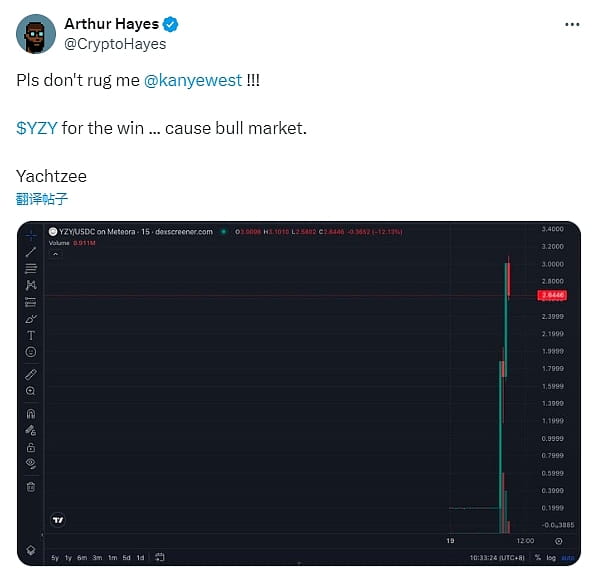
What is the YZY project? What controversies currently exist? How do we view the phenomenon of celebrities issuing tokens?
1. Overview of the YZY project
The token released by Kanye West is named YZY, which the official website explains as 'YZY is the token that supports all transactions within YZY MONEY,' and YZY MONEY allows you to 'take control of everything without being influenced by centralized authorities.'
His post on X included a picture, suspected to be his cryptocurrency address, along with a link to the official website.
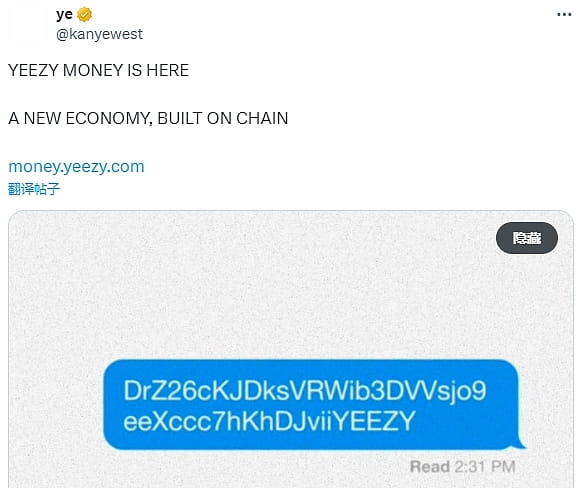
After he released a video confirming the launch of YZY, the market cap of the YZY token briefly reached $3 billion. According to data from the GMGN.Ai analysis platform, the token's market cap is currently around $1.14 billion. The highest trading price was $3.23, and as of the time of writing, it has fallen to $1.1493, down 64.42% from its peak.
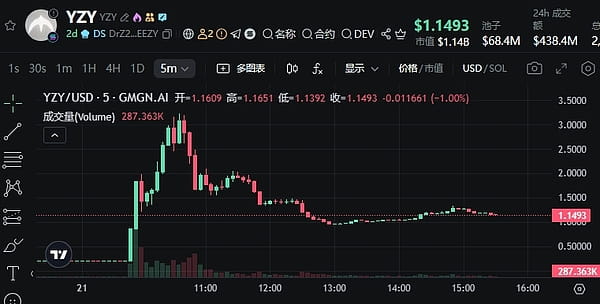
The official website of YZY MONEY provides specific information about the YZY tokenomics: 20% for public issuance, 10% for the liquidity pool, 30% allocated to Yeezy Investments LLC (locked for 3 months, linear release over 24 months), 20% allocated to the team (locked for 6 months, linear release over 24 months), and 20% for the ecosystem development fund (locked for 12 months, linear release over 24 months).
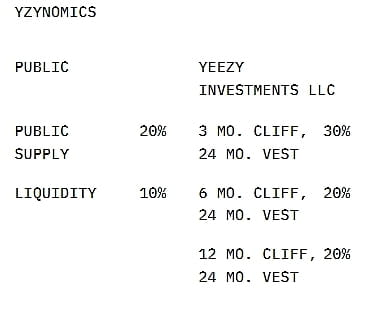
YZY minted on Solana. YZY aims to serve as an expression of 'support and participation' for the ideals embodied by the symbol, rather than an investment opportunity. The YZY ecosystem includes Ye Pay (a cryptocurrency payment processor that allows merchants to accept credit card and cryptocurrency payments with lower fees) and the YZY credit card.
YZY employs an anti-sniping mechanism, deploying 25 contract addresses and only selecting one as the official YZY token. The token's exercising plan uses Jupiter Lock—a publicly audited open-source protocol, divided into three parts, each with different cliff periods and a 24-month vesting schedule. It can be traded through Meteora on Solana, and the official liquidity pool address has been made public.
2. Controversies related to YZY
1. Insider wallet arbitrage
Conor Grogan, a Coinbase executive, stated on social media, 'I estimate that at least 94% of YZY tokens are held by insiders; 87% of the tokens are held by a single multi-signature wallet (which has now been distributed to multiple wallets); over 3% of the tokens were purchased at market opening by multiple (pre-prepared) wallets through a single large transaction; over 7% of the tokens are in the liquidity pool.'
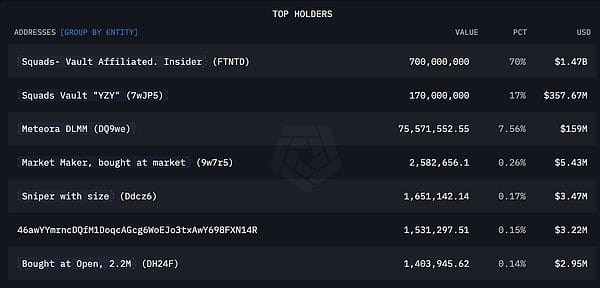
According to Lookonchain monitoring, since YZY's launch, only YZY has been added to the liquidity pool, not USDC. Developers can sell YZY by adding/removing liquidity, similar to LIBRA. Multiple insider wallets had funds prepared in advance and immediately bought YZY after the announcement. One address starting with 6MNWV8 attempted to purchase yesterday, spending 450,611 USDC to buy 1.29 million YZY at $0.35, then sold 1.04 million YZY for $1.39 million, keeping 249,907 YZY (approximately $600,000), profiting over $1.5 million.
Additionally, an investor suspected of having insider information lost $710,000 by buying the wrong YZY. Subsequently, this address purchased the legitimate YZY for $761,000 and has now profited over $710,000.
2. Did Kanye West really issue a token?
As early as February of this year, Kanye West stated that he would not issue cryptocurrencies because these cryptocurrencies 'deceive fans with hype.' West also pointed out that someone contacted him to promote a fake cryptocurrency on social media for $2 million.
As a result, many people do not believe Kanye West truly issued a token, and suspect that Kanye West's account has been hacked. On X, many speculate in the comments under Kanye West's video that the content of the video was AI-generated, rather than recorded by Kanye West himself.
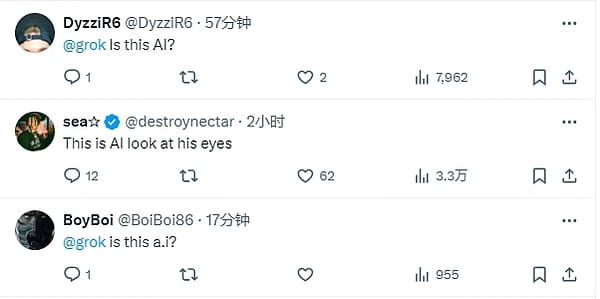
Polymarket even launched a bet on whether Kanye's account was hacked.
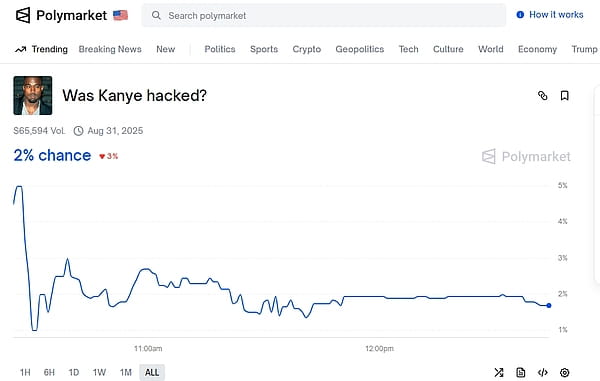
However, the official website and his online store list YZY as a potential payment option, suggesting that the project may indeed have been launched by Kanye West.
3. How do we view the phenomenon of celebrities issuing tokens?
The phenomenon of celebrities issuing tokens has become commonplace in the cryptocurrency industry. From the President of the United States to celebrities across various fields, there are many token issuers.
On January 17, 2025, Trump announced his Meme coin: TRUMP Coin on social media. After TRUMP Coin launched, the price fluctuated significantly, starting at $0.1824, rising over 15,000% in 12 hours to about $30, peaking at $75.35 within 24 hours, with a market cap reaching $82 billion, before the price corrected.
The day after Trump issued his coin, his wife Melania also launched a Meme coin named after herself, 'MELANIA', and their young son soon followed with a Meme coin named 'BARRON'.
In late May 2025, Olympic decathlon champion Caitlyn Jenner released her own Meme coin on the Pump.fun platform; R&B singer Jason Derulo and Sahil Arora collaborated to issue the JASON token; rapper Waka Flocka Flame also issued his own Meme coin FLOCKA; and Australian musician Iggy Azalea previously issued the token MOTHER.
Without exception, these celebrity coins have been in high demand for a time, only to quickly retreat. Most celebrity coins have long since disappeared, except for TRUMP Coin, which occasionally experiences significant price increases due to Trump's actions or statements.
Celebrity token issuance capitalizes on their fame, traffic, and fan base to monetize, resulting from the collision of 'attention economy' and 'hype.' Whether it is the president or an ordinary celebrity, tokens usually see a rapid increase after launch, followed by a sharp decline. Due to the lack of actual value support, the rise and hype can only be fleeting.
Celebrities issuing tokens first face regulatory compliance issues. Under the U.S. regulatory framework, many celebrity coins are considered 'unregistered securities,' involving risks of 'illegal fundraising' and 'illegal token sales.' Furthermore, most meme coins are suspected of exploiting investors, lacking actual value support and relying solely on celebrity effects to attract fan investments, along with irregular trading practices such as pump and dump, which have led many investors to be capitalized. Finally, the phenomenon of celebrities issuing tokens involves serious speculative behavior, contrary to the geek spirit of cryptocurrency technology, making it difficult to discuss technological innovation, which is detrimental to the long-term development of the industry.
However, the issuance of tokens by celebrities is not entirely without merit. For example, after Trump issued TRUMP Coin, more Americans became aware of blockchain technology and cryptocurrency, and began to try to participate, which has had a positive impact on raising public awareness of cryptocurrency.
4. Conclusion
YZY is still in its early stages, and whether the project can truly succeed depends on its practical implementation. Without real application scenarios, YZY will merely be a speculative meme coin, destined to be submerged among countless tokens. For investors, it is important to invest rationally, avoid blindly following hype, and be able to identify projects with long-term actual value, which is the essence of investment.





